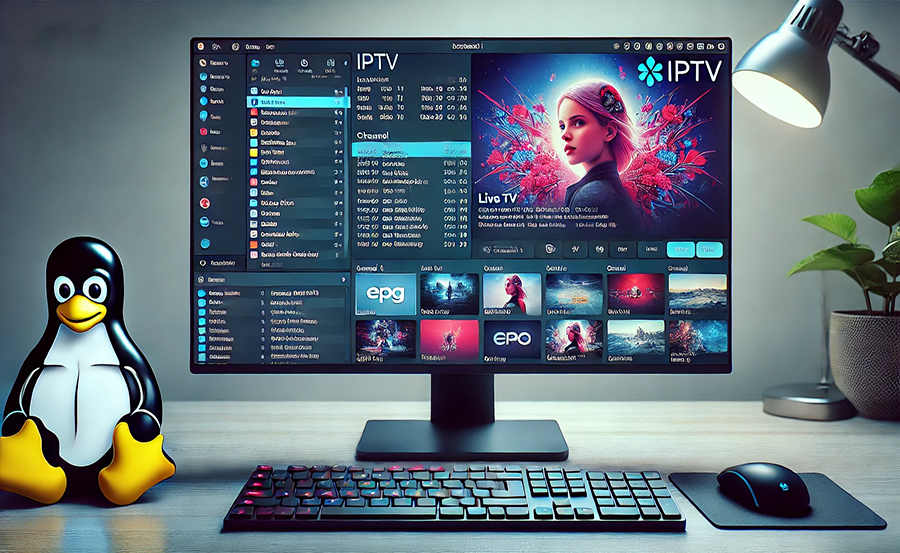In an era where streaming dominates our entertainment choices, Linux users often find themselves in a unique niche. Not everyone uses Linux, and those who do tend to be tech-savvy and appreciate having more control over their streaming experiences. Internet Protocol Television (IPTV) has emerged as a fantastic way to access a plethora of television content through the internet, and for Linux users, this opens up a world of possibilities. But, should you opt for a free service or a paid one? Let’s explore the nitty-gritty details of what each option entails.
Buy 1 Year IPTV Subscription and Enjoy Unlimited Content
Understanding IPTV: The Basics for Beginners
Before diving into the comparison, it’s crucial to understand what IPTV really is. IPTV stands for Internet Protocol Television. It delivers television content over the internet, unlike traditional formats such as satellite or cable. For many, IPTV on Linux provides a seamless experience, integrating easily with the system’s versatile nature.
For those new to IPTV, one of the biggest advantages is the ability to customize how you consume media. Unlike standard cable, IPTV offers flexibility that aligns beautifully with Linux’s open-source philosophy. This might ring a bell, or maybe it’s an opportunity to maximize your streaming delight.
Expert Insight:
Watch your favorite sports channels seamlessly with Top IPTV subscriptions for unparalleled streaming quality.
How Does IPTV Work?
IPTV works by streaming media content directly to the user via an internet connection. This sets it apart from cable or satellite TV, which require a more traditional connection. Linux users, often being adept at managing their networks, find IPTV’s streaming process to be straightforward – giving them control over how and when they watch their favorite shows and movies.
In a nutshell, IPTV leverages your internet connection to stream content. This means your viewing experience heavily depends on your internet speed and bandwidth. This is another aspect where tech enthusiasts like Linux users can tweak for optimal results.
Why Choose IPTV for Your Linux System?
Opting for IPTV on a Linux system brings numerous benefits, primarily due to Linux’s flexibility and capability to support diverse software solutions. IPTV applications can be easily integrated into various Linux distributions, potentially enhancing user experience.
Moreover, Linux’s strong security features mean that IPTV content can be streamed with peace of mind, without the persistent worries of malware or security breaches that might plague other operating systems. And let’s not forget Linux’s efficient use of resources, ensuring smooth playback even on systems with less powerful hardware.
Deep Diving into Free IPTV Services
Free IPTV services can be enticing because, well, they’re free. Who doesn’t like free stuff, right? For Linux users who might already be managing multiple free open-source applications, extending this to their IPTV service might feel like a natural progression.
Advantages of Free IPTV Services
- Cost-Effective: Since there are no subscription fees, you can explore IPTV without budgetary constraints.
- Variety: Free services often have a vast array of channels from different regions.
- Test Before You Commit: You can experiment with different services before deciding on a particular setup.
Free services promise a lot with minimal investment. However, as with anything free, there are trade-offs to consider which might affect your decision.
Potential Downsides of Free IPTV Services
- Unreliability: Free services might lack consistent uptime, leading to unexpected downtimes.
- Quality Issues: Often, the video quality isn’t up to par with paid services – think buffering and pixelation.
- Limited Support: Customer support is generally minimal or nonexistent.
While the zero-cost entry is attractive, Linux users need to weigh if the potential glitches and gaps in service outweigh the monetary savings.
Exploring Paid IPTV Services
In contrast, paid IPTV services are often associated with reliability and quality. For Linux enthusiasts, investing in a paid service might be more befitting given their appreciation for high performance and reliability.
Why You Might Choose a Paid IPTV Service
- Enhanced User Experience: Generally, paid services come with better streaming quality and reliability.
- Comprehensive Customer Support: Most companies offer support to help resolve any issues you might encounter.
- Legal Security: Paid services are more likely to have proper licenses, reducing risks associated with illegal streaming.
Paying for an IPTV service might just be the ticket to fully optimize your streaming experience, without the annoying interruptions that free services might present.
Which IPTV Subscription Plan is Best?
Choosing the right IPTV subscription plan can be overwhelming given the variety of options available in the market. Linux users should consider their viewing habits and budget when evaluating different plans.
For instance, if live sports are your main interest, look for a package that emphasizes sports networks. If it’s movies and series, see if the service offers a robust video-on-demand catalog. Remember, what maximizes your streaming delight might not be the same for everyone else, it’s tailored to your preferences.
Key Considerations for Linux Users
Just like software packages, IPTV services differ significantly, and choosing the right one as a Linux user requires careful thought. Here are some factors Linux users specifically should weigh during this decision-making process:
Compatibility and Integration with Linux
Not all IPTV services offer the same level of compatibility with Linux. Look for providers that offer Linux-friendly applications or services, ensuring a seamless integration with your system. A service with strong developer support can significantly ease this integration process, saving time and headaches.
Moreover, it helps if the service provider has a community or forum where Linux users share insights on compatibility and troubleshooting. This peer support can be valuable when navigating technical challenges.
Open Source Versus Proprietary Software
Linux users often appreciate open-source software due to its transparency and community-driven improvements. When evaluating IPTV services, consider whether their software leans on open-source principles or proprietary technology.
This may impact not only the user experience but also your comfort level in terms of control, customization, and security. Make sure you are aware of any proprietary limitations that might hinder your user experience.
Security and Privacy Concerns
Regardless of whether the IPTV service is free or paid, Linux users must prioritize security and privacy. Paid services often boast enhanced legal and security measures; however, it’s essential to scrutinize these claims.
Always check if the service encryption standards and privacy policies align with your personal standards. Linux users, who tend to be more vigilant about such matters, should not take these lightly.
Case Studies: Free vs. Paid IPTV Users
To truly appreciate the differences between free and paid IPTV services, let’s look at a couple of case studies highlighting experiences from Linux users like yourself.
Case Study: The Free IPTV Enthusiast
Alex, a Linux user with a penchant for experimenting with different tech solutions, opted for a free IPTV service. With no initial cost, Alex was thrilled to access a variety of international channels. The excitement, however, soon evolved into frustration with frequent buffering and unpredictable downtimes.
Nonetheless, Alex found the free service a useful transitional phase, ultimately leading towards choosing a paid service that better met their expectations for reliability and quality.
Case Study: The Paid IPTV Advocate
Jordan, another Linux aficionado, took a different approach, opting to invest upfront in a renowned paid IPTV service. The decision stemmed from a desire for consistency and high-quality streams. Jordan appreciated the comfort of having comprehensive customer support readily available.
Ultimately, this investment paid off, providing a holistically pleasant viewing experience, underscoring the adage that sometimes, you do get what you pay for.
The User Experience: Free vs. Paid
When it comes to user experience, free and paid IPTV services offer distinct paths. Free services can often feel unreliable with their streaming services, while paid ones are designed to deliver a smooth, hassle-free experience. But this, of course, comes with a price tag.
Is It Worth Paying for IPTV on Linux?
For many Linux users, the peace of mind that comes with paid services is worth the investment. With reliable streams and dedicated support, the overall experience aligns well with what they expect from a solid piece of technology or service.
In terms of maximizing your streaming delight, spending those extra dollars could pave the way for a more satisfying and less time-consuming media consumption routine.
10 Tips to Maximize Your IPTV Streaming Delight
While the debate between free and paid services continues, enhancing your streaming experience is possible regardless of your choice. Here are some tips tailored for Linux users:
- Ensure a robust internet connection to minimize buffering.
- Regularly update your IPTV software to the latest version.
- Use plugins or scripts to automate routine tasks.
- Explore community forums for insights and tips.
- Consider trying hybrid setups – combining free and paid services.
The Final Thought Experiment
This journey through IPTV services has hopefully illuminated the paths available to Linux users. Whether free or paid, each option has its distinct value, risks, and benefits. The ideal choice ultimately lies in your hands, balancing what you prioritize most—cost, convenience, quality, and security.
As you weigh your needs, consider how each service harmonizes with your Linux system and lifestyle. What works seamlessly for one might be a misfit for another, emphasizing the importance of tailored, personal decision-making in maximizing your streaming experience.
FAQs: Unpacking Common IPTV Questions

What is the main difference between free and paid IPTV services?
Free IPTV services are cost-effective and offer a broad array of channels without a subscription fee; however, they often suffer from reliability and quality issues. Paid IPTV services, while requiring a subscription, generally offer higher-quality streams, consistent service, and customer support.
Are there any legal concerns associated with IPTV?
Yes, the legality of IPTV services can vary. Free IPTV services might stream unauthorized content, leading to potential legal concerns. In contrast, paid services are more likely to secure distribution rights, minimizing legal risks for users.
Can Linux users easily set up IPTV services?
Yes, Linux users can typically set up IPTV services with ease due to Linux’s versatile nature and the availability of various IPTV software that is compatible with Linux systems. Consulting community forums can aid in overcoming any setup challenges.
How can I ensure the best streaming quality on my Linux device?
To optimize streaming quality, ensure your internet connection is stable and fast. Also, keep your IPTV application updated and consider using Ethernet over Wi-Fi for more reliable data delivery.
Is there customer support available for free IPTV services?
Customer support for free IPTV services tends to be limited or nonexistent due to the lack of revenue to support these services. Conversely, paid services usually offer dedicated support teams to assist with any issues.
Do paid IPTV services offer better content libraries?
This depends on the service provider. Often, paid services have access to a wider range of licensed content, including movies, TV shows, and exclusive channels. It’s worth comparing providers based on your specific content preferences.
How to Enable Content Filters for IPTV on Smart TVs





